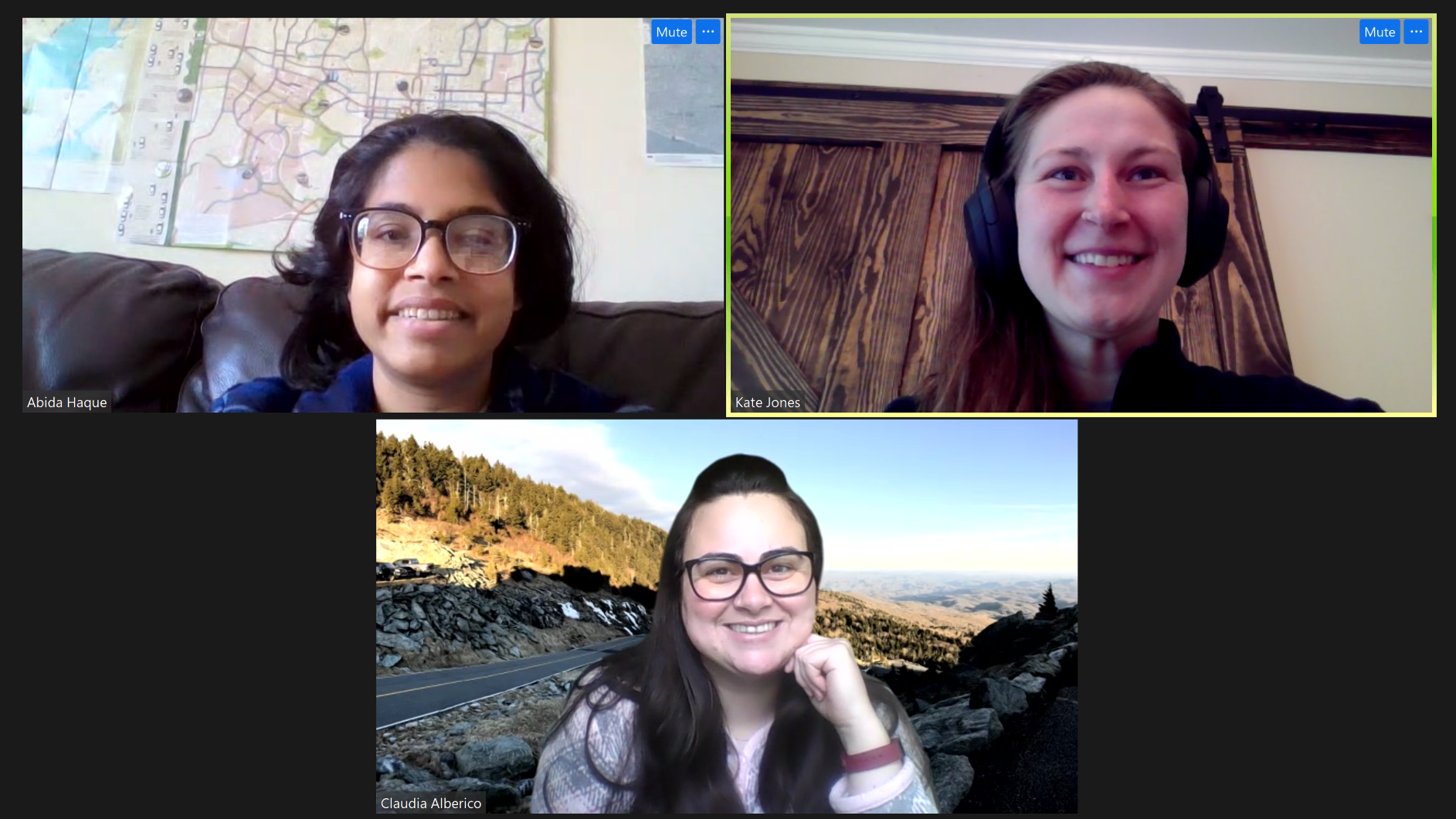Alumni Insights with Tim Becker, Rhetoric & Composition M.A.

My name is Bethany Van Scooter, and I chose to interview Tim Becker, M.A. because I am currently a Master’s student in the same program he recently graduated from. I am hoping to get a teaching position at a four-year institution as well and thought Tim would be able to help me with my career goals and path. The following answers to the questions are in Tim’s own words (edited for the blog’s specific purposes).
Why/how did you choose to work at Virginia Tech? What did that job search and application process look like?
I chose to work at Virginia Tech partly due to necessity, but also because my teaching philosophy and pedagogy aligned perfectly with their programmatic outcomes and curriculum. After researching dozens of programs in my teaching area (first-year writing) across the country, I could tell whether or not different institutions value composition as a discipline, and Virginia Tech stood out in terms of support for writing instruction and instructors.
How could you tell your discipline was valued at Virginia Tech?
I was definitely drawn to programs that had an online presence for their composition program. Colleges typically have dedicated pages for various departments and programs, so if the school website had nothing about composition, that was a red flag. For those that do have an online presence, descriptions of the program and its goals were very telling. For example, a quick glance at the first-year writing course descriptions or outcomes could be instructive.
Composition as a discipline embraces pedagogies that emphasize rhetoric, process work, multimodality, reflective practice, and other crucial outcomes, so if a course description signaled that the primary (or only) outcome was application of grammar instruction, that was concerning to me.
Other indicators came across in the job descriptions themselves; for example, those that preferred applicants with graduate study in Rhetoric & Composition or with experience teaching first-year writing, signaling that they recognize the value of specialized knowledge and expertise in the classroom.
How did you get/find your current position?
Prior to actively applying for jobs, I knew that the job market would be challenging and I prepared for the heavy amount of labor, stress, uncertainty, and waiting. Even so, the process of finding a faculty position was long and discouraging. I subscribed to a ListServ in my field that included job postings, kept a close watch on a discipline-specific site rhetmap.org and regularly searched sites like academicjobsonline.org, higheredjobs.com, chroniclevitae.com, and indeed.com.
I started applying to the occasional job a year before I graduated, but the bulk of my search occurred between March and June 2019. In those three months, I applied to dozens of positions from tenure-track to adjunct at 23 different institutions (two-year and four-year) across North Carolina, Virginia, West Virginia, Maryland, Pennsylvania, New Jersey, New York, and Ohio. Few were considerate in letting me know that a position had been filled or my application rejected, but for the majority of them, it was radio silence.
[marketing-quote color=’blue’ align=’center’]I kept a spreadsheet of jobs to apply for as well as pending job applications I submitted.[/marketing-quote]
Strangely enough, I didn’t find out about the Virginia Tech opening from any of the sites that I checked regularly; rather, I happened to look into their first-year writing program (I don’t even remember why!) and noticed that their website had pinned a tweet from the program director saying that they were hiring.
From that moment on, things moved very quickly. In a span of a week, I had heard back about an adjunct position in Maryland, a lecturer position in North Carolina, and set up an interview with Virginia Tech. I was offered the position the following day.
It came down to a difficult choice between the two full-time positions, but I gained such a great impression of Virginia Tech from their materials and the interview and the offer made more financial sense, so I accepted. I’m currently on a one-year contract with high expectation of renewal.
What is the culture and professoriate life at VT like?

My perception of the culture at Virginia Tech is heavily influenced by the rather unusual condition of being hired at the same time as twelve other new instructors, most of whom hadn’t yet held academic positions apart from our graduate teaching assistantships. Given that we went through onboarding, curricular workshops, and moving to Blacksburg at the same time, we quickly developed into a social and supportive cohort within the larger (also supportive) culture of the First-Year Writing Program and the English department in which it is housed.
Most of the new instructors share offices, so there’s a strong sense of community and frequent exchange of ideas and materials. Moreover, the department regularly plans teaching talks and workshops, hosted a regional rhetoric and writing conference in which most of us participated, and provides travel funding—most of us intend to travel together to a national conference in March.
What do you like about your job?
The best part of my job is my students. Most students in our courses are enrolled in STEM majors, perhaps assuming that first-year writing is an obligatory chore with little bearing on their educational paths, but many leave with an appreciation for the complexity of writing in postsecondary contexts and beyond and for themselves as writers.
I like that my position is dedicated to first-year writing in a program that aligns with my values, has a strong sense of community, encourages frequent exchange of ideas and materials, and gives instructors some curricular freedom.
What would you change about your position/job?
If I could change anything about my position, I would reduce the teaching load. First year writing sections are capped at 20 students, which is a reasonable number, but instructors teach a 4-4 course load (meaning 4 courses one semester and then 4 again the next semester) for a total of 80 students per semester. While this course load is manageable, particularly compared to other positions I applied for, reducing that course load to 3-3 would permit more dedicated time to each student and their work, thereby improving their learning opportunities.
Moreover, unlike other departments or programs with their own spaces, we do not have classrooms dedicated to composition. As a result, our courses are scattered across campus wherever rooms are available, whether or not they are well-suited to the collaborative and technologically-driven activities that often take place in composition courses.
How much of your time at VT is devoted to teaching? How about to research?
I’m still actively involved in research on several topics: the use of metaphors to describe how learning is transferred between different contexts; the rhetorical dimensions of Digital Audio Workstations in music production; the use of video game procedures to promote human flourishing; the internet phenomenon of endlessly remixing syndicated newspaper comics. With that in mind, my position is fully devoted to teaching four sections of first-year writing (12 credit hours) each semester—precisely what I was looking for in a career.
What does a day in your teaching life look like?
My teaching days begin fairly early, with my first section starting at 8:00am, my final section ending at 4:45pm, and office hours in between. Although I plan my course ahead of time, I still find myself devoting quite a bit of time each day to preparing lesson plans as well as grading, holding student conferences, and responding to emails. Although my overall workload has increased, I’ve been settling into the change, finding more balance with personal interests and social activities in this position than I experienced in graduate school.
How does this compare to work at other colleges, especially since you taught at NC State for a bit as well?
The biggest difference between teaching at NC State as a Graduate Teaching Assistant (GTA) and Virginia Tech as a full-time instructor was—of course—transitioning from teaching nineteen students per semester to teaching eighty. Nevertheless, my experiences at NC State prepared me to adapt to such challenges.
How did your NCSU training help prepare you for the job you’re in now?
The mentoring and professional development opportunities in the First-Year Writing Program were invaluable, and teaching there provided me with discipline-specific knowledge and experiences that carry over into my current classrooms.
 Even so, the Teaching & Communication Certificate program was not merely supplemental, but rather crucial for developing the skills I use on a daily basis: using multiple modes of instruction to engage students of all learning types, planning classroom activities, adopting best practices for accessible design and teaching, and so on.
Even so, the Teaching & Communication Certificate program was not merely supplemental, but rather crucial for developing the skills I use on a daily basis: using multiple modes of instruction to engage students of all learning types, planning classroom activities, adopting best practices for accessible design and teaching, and so on.
Beyond that, the program provided workshops that helped me create more compelling application materials including my teaching philosophy statement. All of the workshops were valuable, but I particularly benefited from the Teaching and Presentation Practicum, which provided pedagogical practice, experimentation, peer feedback, and a safe space for trial and error in leading classroom activities. Moreover, I greatly enjoyed interacting with and learning from brilliant people across the disciplines.
What advice would you give to someone looking into the academic job market?
For those about to enter the academic job market, most of the advice I have to offer would sound familiar:
- cast a wide net,
- be willing to move,
- start long before you graduate,
- tailor your materials for every application,
- send emails introducing yourself and asking smart questions to personnel in the departments,
- inform your recommenders way ahead of time what positions you are applying for, and so on.
I also have some advice to give that no one ever told me. I suggest making a spreadsheet of jobs you intend to apply for, noting which ones you are well-qualified for and which ones are more of a stretch, which ones have best-consideration deadlines, and some notes about why you are interested (including salary, workload details, etc.), then use these metrics to guide how you spend your energy and time.
 Keep records of every application, including when you applied and when a decision is expected. If you want to get technical, you could even use a free point-and-click web-scraper application like ParseHub (no coding knowledge required) to grab all of the listings from a job site search automatically.
Keep records of every application, including when you applied and when a decision is expected. If you want to get technical, you could even use a free point-and-click web-scraper application like ParseHub (no coding knowledge required) to grab all of the listings from a job site search automatically.
Also, given that I found my position not from a job search site, but rather by browsing the website for an institution I was interested in, I suppose some non-systematic browsing might be worth doing once in a while.
In addition to keeping your search more organized, systematic, and efficient, this sort of record-keeping helps you stay honest with yourself. There were times when I felt frustrated and convinced that I must have applied to forty jobs, but my records helped me keep perspective—most of the time, anyway.
- Categories:


